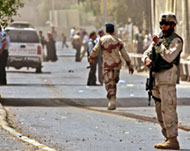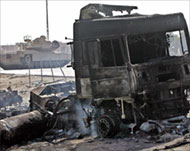Untitled Document
 |
Most attacks are in the region
to the north and west of Baghdad |
The commander of US transportation and other logistics forces in Iraq
has said the number of roadside bomb strikes against his soldiers throughout
the country has doubled in the past year.
Army Brigadier-General Yves Fontaine, commander of the 1st Corps Support Command,
on Friday said the number of attacks along supply routes had grown to about
30 per week, although the US casualty rate has declined because extra protective
armour has been installed on supply trucks and other vehicles in the transportation
fleet.
Most of the attacks, he said, are in the region that extends north and west
of Baghdad.
"We have seen an increase in the use of IEDs on our convoys," he
said, using the military's acronym for improvised explosive devices, or roadside
bombs.
"And our main threat is the IED for the logistics convoys coming from
Kuwait, Jordan and Turkey, and then going to the Baghdad area."
Extra armour
 |
More than 2000 supply vehicles
have been given extra armour |
Speaking in Washington at the Defence Department by a video link from his headquarters
at Balad air base, north of Baghdad, Fontaine said more than 2000 supply vehicles
have been given extra armour and that no vehicle is sent outside a secure base
without armour.
"That's a good news story, as far as our up-armouring is concerned,"
he said.
"Because we have up-armoured our vehicles the casualties have decreased
significantly even though IED attacks are increasing." He did not offer
specific casualty figures.
Fontaine also said his force, which numbers about 18,500 soldiers based at
five main hubs, has responsibility for helping the Iraqis develop their own
military logistics system to sustain their combat forces.
So far, two of the three existing Iraqi motorised transportation regiments
are capable of operating on their own, Fontaine said. The goal is to have nine
or 10 fully independent Iraqi support regiments by this time next year, he added.

